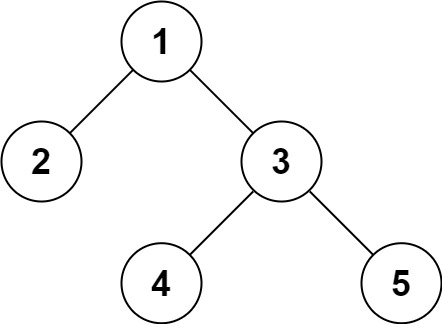LeetCode in Kotlin
297. Serialize and Deserialize Binary Tree
Hard
Serialization is the process of converting a data structure or object into a sequence of bits so that it can be stored in a file or memory buffer, or transmitted across a network connection link to be reconstructed later in the same or another computer environment.
Design an algorithm to serialize and deserialize a binary tree. There is no restriction on how your serialization/deserialization algorithm should work. You just need to ensure that a binary tree can be serialized to a string and this string can be deserialized to the original tree structure.
Clarification: The input/output format is the same as how LeetCode serializes a binary tree. You do not necessarily need to follow this format, so please be creative and come up with different approaches yourself.
Example 1:

Input: root = [1,2,3,null,null,4,5]
Output: [1,2,3,null,null,4,5]
Example 2:
Input: root = []
Output: []
Constraints:
- The number of nodes in the tree is in the range
[0, 104]. -1000 <= Node.val <= 1000
Solution
import com_github_leetcode.TreeNode
/*
* Definition for a binary tree node.
* class TreeNode(var `val`: Int) {
* var left: TreeNode? = null
* var right: TreeNode? = null
* }
*/
class Codec {
private var offset = 0
// Encodes a tree to a single string.
fun serialize(root: TreeNode?): String {
val sb = StringBuilder()
offset = 0
serialize(root, sb)
return sb.toString()
}
fun serialize(root: TreeNode?, sb: StringBuilder) {
// all nodes fit into 4 bits.
// IFF we offset at 0. So encode(val) = val + min(default - 1000)
if (root == null) {
sb.append(DELIM)
return
}
val s = Integer.toHexString(root.`val` + BASE_OFFSET)
val sb2 = StringBuilder()
for (i in 0 until 3 - s.length) {
sb2.append('0')
}
sb2.append(s)
sb.append(sb2)
serialize(root.left, sb)
serialize(root.right, sb)
}
// Decodes your encoded data to tree.
fun deserialize(data: String): TreeNode? {
if (data[offset] == '*') {
offset++
return null
}
val root = TreeNode(
data.substring(offset, offset + 3).toInt(16) - BASE_OFFSET,
)
offset += 3
root.left = deserialize(data)
root.right = deserialize(data)
return root
}
companion object {
private const val BASE_OFFSET = 1000
private const val DELIM = "*"
}
}
/*
* Your Codec object will be instantiated and called as such:
* var ser = Codec()
* var deser = Codec()
* var data = ser.serialize(longUrl)
* var ans = deser.deserialize(data)
*/

